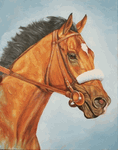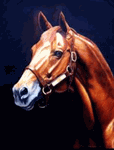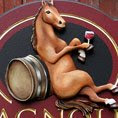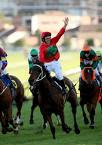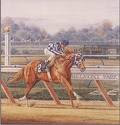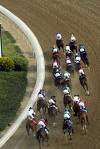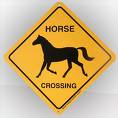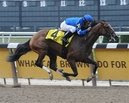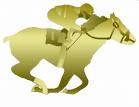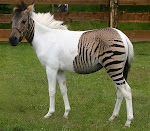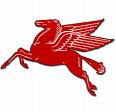May 26th, 09
How many times have we seen this happen? A jockey, thinking he is on a “live” horse but with nowhere to go, makes a sudden lane switch in tight quarters at the top of the stretch, bumping or impeding another horse in the race. Oftentimes the “live” horse turns out to be a dud and is outrun to the wire, finishing out of the money. Because there is no need for an inquiry, the stewards scarcely give the incident a second look.
Sometimes, if the jockey in question is an apprentice or young journeyman, the stewards will call him or her in the next racing day to review the incident in the film room. Occasionally, the jockey might get a fine or suspension. Far too often, these incidents pass without any warnings or repercussions to the jockey. No harm, no foul, the thinking goes. But then we have a situation in which there were severe consequences, as in Saturday’s Arlington Matron at Arlington Park near Chicago. Jamie Theriot, riding Sky Mom, was tucked in along the rail, right behind the leader, and anxious to let his horse run. Even though Rene Douglas and his mount, Born to Be, was racing shoulder to shoulder with Sky Mom, Theriot forced his way out, jostling with Douglas’ mount, and resulting in Born to Be clipping heels, throwing Douglas to the ground, and then rolling onto the fallen jockey and causing severe damage to his spine. Moments later, the horse on the lead that Theriot was so impatient to pass, drifted off the rail while tiring, providing enough room to drive a Mack truck through. By then, however, it was too late. The damage had been done. Born to Be suffered a fatal injury, and Douglas likely had his highly successful career cut short. There’s a very good chance he’ll never walk again. Theriot was only riding the way stewards in too many racing jurisdictions allow him to ride. Watch the replays from any track on any given day, and you’re likely to see similar moves by other jockeys — some with less experience, others with more — than the 30-year-old Theriot. Stewards who don’t pay attention to these incidents, who live by the “no harm, no foul” philosophy, are like the referees in a basketball game who don’t call many fouls, who “let the kids play,” at least until things get out of control. The stewards who let these incidents pass, just as much if not more than Jamie Theriot, are to blame for the accident that so severely injured Douglas. Theriot got a 30-day suspension for his actions in the race from the stewards at Arlington Park. It’s a moot point now, but I’m curious if there would have been any disciplinary action taken against Theriot had Born to Be not clipped heels and fallen after being bumped, and Douglas not been injured. Would the same move off the rail by Theriot, but with no accident and death to a horse and injury to a jockey, have resulted in a 30-day suspension? I don’t think so. The Illinois Racing Board stewards refused to discuss the incident with the Paulick Report or with other reporters. It is part of racing’s secret society, the one that says the public has no right to know what these “judges” are seeing and thinking during or after the running of a race. In many racing states, it’s virtually impossible to find out if stewards have taken action against jockeys, trainers or other licensees, even though the rulings are a matter of public record. By contrast, racing officials in many international jurisdictions routinely file in-depth stewards reports on every race they see. It is part of the culture in those countries that the racing public has a right to know. In some countries, trainers are required to disclose riding instructions to racing officials in advance if they are likely to result in a change in tactics. In other countries, jockeys or trainers are quizzed when a horse has a reversal in form. Interviews with jockeys about lane changes are published. Click on the following hyperlinks to see some examples of stewards reports in
Dubai, Hong Kong, Australiaand Singapore. There are at least two reasons state racing commissions across the United States should insist their stewards file similar reports. First, it will indicate whether or not these officials are doing their jobs, or how well they are doing them. The racing public, as well as horsemen, will keep the stewards’ feet to the fire and make sure they are paying attention and performing their duties. Many of the currently unreported riding incidents may no longer be brushed aside. Second, the betting public deserves to know what is going on in the races on which they are betting their money. This is, after all, a game with betting at the foundation, and diligence and attention by the officials who are paid to keep the game clean and on the up and up should go a long way toward building confidence among horseplayers and satisfying the public’s desire and right to know. Racing has so many challenges now, many of which do not have immediate solutions. This is not one of those “unsolvable problems.” Disclosure and transparency by racing stewards is easy. And it’s the right thing to do.
By Ray Paulick
.





